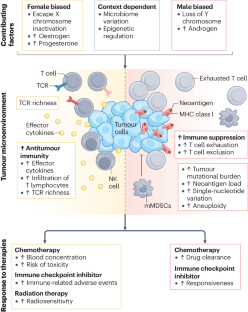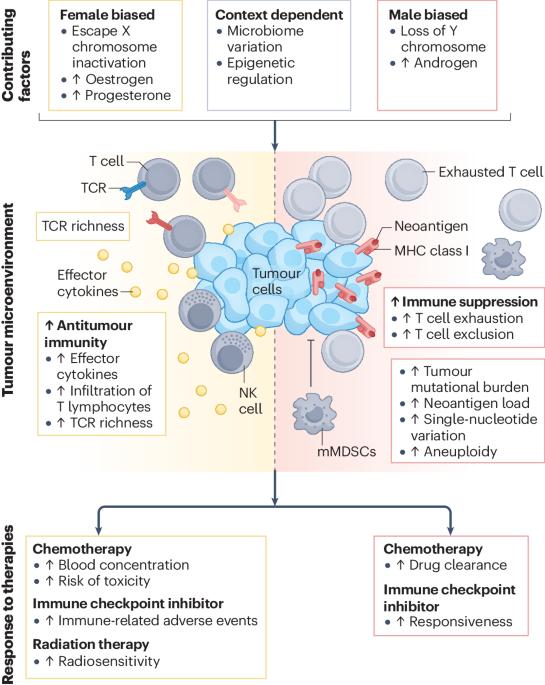免疫肿瘤学中的性别偏见特征:机制和治疗意义
IF 72.5
1区 医学
Q1 ONCOLOGY
引用次数: 0
摘要
在多种非生殖器官癌症中都存在性别差异,男性癌症发病率通常较高,治疗效果较差。虽然这些差异的一些内在机制正在形成,但其免疫学基础尚不十分清楚。临床试验的观察结果也表明,常规免疫疗法存在性别偏差,男性患者对免疫检查点阻断疗法的反应更佳,而女性患者则会出现更严重的不良反应。在这篇 "视角 "文章中,我们总结了免疫肿瘤学中性别偏见的主要生物学特征。我们重点关注性激素和染色体编码基因产物的信号传导,以及肿瘤和免疫细胞(如骨髓细胞和 T 细胞)中不依赖于性激素和不依赖于染色体的表观遗传机制。最后,我们强调了未来研究性别差异的机会,这些研究将性激素、染色体和其他新出现的癌症特征(如老龄化和微生物组)结合在一起,从而更全面地了解性别差异如何成为癌症反应的基础,从而利用性别差异制定更有效的免疫肿瘤学方法。本文章由计算机程序翻译,如有差异,请以英文原文为准。


Hallmarks of sex bias in immuno-oncology: mechanisms and therapeutic implications
Sex differences are present across multiple non-reproductive organ cancers, with male individuals generally experiencing higher incidence of cancer with poorer outcomes. Although some mechanisms underlying these differences are emerging, the immunological basis is not well understood. Observations from clinical trials also suggest a sex bias in conventional immunotherapies with male individuals experiencing a more favourable response and female individuals experiencing more severe adverse events to immune checkpoint blockade. In this Perspective article, we summarize the major biological hallmarks underlying sex bias in immuno-oncology. We focus on signalling from sex hormones and chromosome-encoded gene products, along with sex hormone-independent and chromosome-independent epigenetic mechanisms in tumour and immune cells such as myeloid cells and T cells. Finally, we highlight opportunities for future studies on sex differences that integrate sex hormones and chromosomes and other emerging cancer hallmarks such as ageing and the microbiome to provide a more comprehensive view of how sex differences underlie the response in cancer that can be leveraged for more effective immuno-oncology approaches. Sex differences impact various non-reproductive organ cancers, often leading to higher cancer incidence and poorer outcomes in male individuals. In this Perspective article, Xiao, Lee et al. outline the biological factors contributing to sex bias in immuno-oncology, emphasizing the need for future research to offer a fuller understanding of sex disparities in cancer.
求助全文
通过发布文献求助,成功后即可免费获取论文全文。
去求助
来源期刊

Nature Reviews Cancer
医学-肿瘤学
CiteScore
111.90
自引率
0.40%
发文量
97
审稿时长
6-12 weeks
期刊介绍:
Nature Reviews Cancer, a part of the Nature Reviews portfolio of journals, aims to be the premier source of reviews and commentaries for the scientific communities it serves. The correct abbreviation for abstracting and indexing purposes is Nat. Rev. Cancer. The international standard serial numbers (ISSN) for Nature Reviews Cancer are 1474-175X (print) and 1474-1768 (online). Unlike other journals, Nature Reviews Cancer does not have an external editorial board. Instead, all editorial decisions are made by a team of full-time professional editors who are PhD-level scientists. The journal publishes Research Highlights, Comments, Reviews, and Perspectives relevant to cancer researchers, ensuring that the articles reach the widest possible audience due to their broad scope.
 求助内容:
求助内容: 应助结果提醒方式:
应助结果提醒方式:


